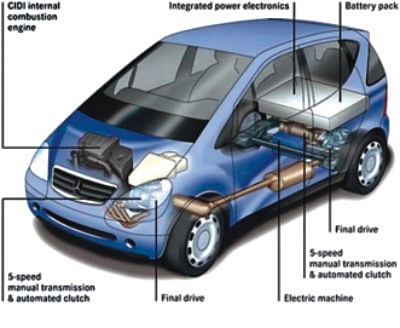Hybrid-car popularity still on low gear

Local automobile traders are reluctant to import fuel-efficient hybrid cars, as they are unable to provide spare parts and after-sales services to the customers due to lack of expertise in dealing with such vehicles, industry insiders said.
Their experience of selling hybrid cars in Bangladesh is not good enough to continue imports, although such cars are more economical than conventional vehicles in terms of fuel consumption, as petroleum prices soared by more than 40 percent in the last one year, they said.
Local traders imported hybrid cars a few years back for the first time when those automobiles were getting popularity in Japan, the major reconditioned car exporter to Bangladesh.
In fiscal 2002-03, some reconditioned car traders imported around 30 Toyota brand hybrid cars, thinking that those cars would get popularity on jam-packed Dhaka streets also.
But imports stopped since then as traders found it difficult to provide after-sales services to the customers due to lack of know-how of the latest technology among the local technicians.
"I imported five reconditioned fuel-efficient hybrid cars from Japan in 2003. And I had to face a lot of problems to sell the cars," said Abdul Haque, managing director of Haq's Bay, one of the leading used car importers.
Some traders earlier imported such cars and the customers were facing problems in getting after-sales services and spare parts, for which they were no more interested in hybrid cars, Haque said.
He said the major reason behind not to go for more hybrid car import is lack of expertise in offering after-sales services. The easier technology to convert diesel-run vehicles into CNG (compressed natural gas)-run is another reason that held back hybrid car use in the country, he added.
"The local automobile market has almost become CNG-driven. So customers prefer low cost CNG cars to high-tech hybrid," he said, adding that Bangladesh market is not mature enough to consume hybrid cars.
These cars are not much popular yet in the global market as well, he said. "Hybrid cars are being used on a small scale in US, Japan and EU."
Traders import on an average 12,000 cars a year, of which 85 percent are Japanese used cars. The country's automobile market's estimated turnover is around Tk 2,000 crore a year, according to Abdul Haque, who is also the president of Bangladesh Reconditioned Vehicle Importers and Dealers Association (Barvida).
From environment perspective, hybrid cars can be suitable for Bangladesh, the Barvida president said. "But for that, a national roadmap is needed to guide which type of cars should be imported to the country."
In a hybrid car, an electric motor and an internal combustion engine are installed so that they can both individually or together power the vehicle.
As the vehicle speed increases or the acceleration demand is higher, the internal combustion engine starts and both the power units work together in parallel.
The installed electric motors and battery capacity may offer a range of 3-5km in pure electric mode, at speed of up to 40km per hour. The Toyota Prius and the Ford Escape Hybrid are examples of vehicles falling into this category.
On the open road, the primary power source is the internal combustion engine, but when maximum power is required, for example to overtake, the electric motor is used to maximise the available power for a short time, giving the effect of having a larger engine than that actually installed.
[email protected]

 For all latest news, follow The Daily Star's Google News channel.
For all latest news, follow The Daily Star's Google News channel. 



Comments